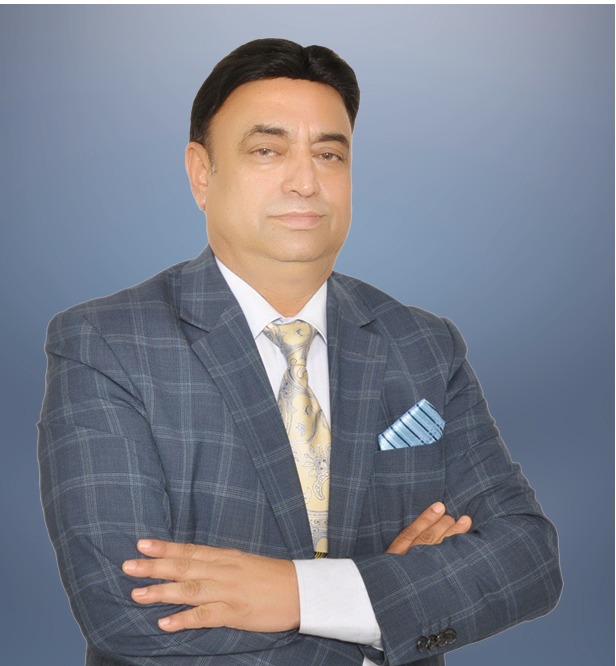
Dr. Mohammed Idrees Salim is a highly respected healthcare professional with over two decades of experience in Saudi Arabia’s medical field. Originally from Sikar, Rajasthan, Dr. Salim completed his MBBS from MGM Medical College, Indore, before beginning his career in the Emergency Department under the Ministry of Health. His expertise in emergency care, along with his dedication to personalized patient care, led him to transition into private practice, where he now manages a network of 52 clinics across Saudi Arabia, including in key national projects like NEOM, Red Sea, and Aramco.
In addition to his contributions to the healthcare sector, Dr. Salim has been instrumental in expanding medical services to remote and offshore locations, operating a fleet of 65 ambulances to ensure critical care is available to all. His leadership and commitment were especially evident during the COVID-19 pandemic, where he led efforts to provide 24/7 healthcare services for expatriates and vulnerable communities.
Dr. Salim’s exemplary service was recognized with the prestigious Saudi Premium Residency, reflecting his nearly 20 years of dedication to the Kingdom’s healthcare system. He continues to contribute to Saudi Arabia’s vision of development, particularly as the nation advances toward its Vision 2030 goals.
Q: Can you tell us about your early educational journey?
A: I am originally from Sikar, Rajasthan, where I completed my higher secondary education before pursuing my MBBS at MGM Medical College in Indore. Coming from a family of medical professionals, it has always been my dream to contribute meaningfully to society through the field of medicine.
Q: What was your experience working with the Ministry of Health in Saudi Arabia’s Emergency Department?
A: My career began in the Emergency Department under the Ministry of Health (MOH). Although there were language barriers initially, working in the ER provided me with valuable experience. Emergency care in Saudi Arabia is world-class, and we handled everything from major accidents to complex medical conditions, including cases involving suicidal patients. Our primary objective was always to stabilize the patient and ensure the best possible outcome.
Q: Why did you transition from the public sector to private practice?
A: While working in the public sector, I felt a strong desire to offer more personalized care. This led me to transition into private practice. I also wanted to address the healthcare challenges faced by the expatriate workforce, particularly women. Many of the 15 million expatriates in Saudi Arabia face difficulties accessing healthcare, whether due to gender-specific barriers or fear of losing their jobs. My goal was to create a safe and accessible healthcare environment, especially for these vulnerable groups.
Q: How did you expand your medical services to remote areas?
A:In 2016, I expanded my practice to include medical services in remote and offshore areas. We started with just one ambulance, and now we operate a fleet of 65 ambulances, providing critical healthcare access to previously underserved regions.
Q: How did you contribute during the COVID-19 pandemic?
A: During the COVID-19 pandemic, healthcare professionals were on the frontlines, and we faced immense pressure. My team and I focused on diagnosing, containing, and treating the virus. Our fleet of 65 ambulances was available 24/7 to transport COVID-19 patients to hospitals. This was particularly important for expatriates who often faced challenges accessing healthcare. My years of social service work helped me empathize with and respond to the needs of these vulnerable communities, reaffirming our social responsibilities as healthcare providers.
Q: What is your guiding principle as a healthcare provider?
A: My guiding principle has always been to provide care without discrimination. Whether a patient is in critical condition or seeking minor treatment, my doors have always been open to everyone. I believe healthcare should be accessible to all, regardless of financial or social status. This commitment is something I upheld during the pandemic and continue to maintain.
Q: Can you tell us about your involvement in managing clinics for key national projects?
A: Currently, I manage a network of 52 clinics that provide essential healthcare services for some of Saudi Arabia’s most prestigious projects. These include NEOM, the Red Sea Project, AMAALA, Diriyah Gate, Aramco, and King Abdullah Economic City (KAEC). In response to client demand, we’ve also deployed a fleet of state-of-the-art ambulances to support these operations, ensuring the highest quality of care in these large-scale developments.
Q: What does receiving Saudi Premium Residency mean to you?
A: Receiving Saudi Premium Residency was a proud moment in my career. It recognizes nearly 20 years of service in the Kingdom and reflects the support of Saudi leadership. This opens new doors for me as an entrepreneur, allowing me to contribute even more to the Kingdom’s economy, especially as it moves toward Vision 2030. I’m eager to continue playing a role in Saudi Arabia’s development, particularly through initiatives like the World Expo 2030 and FIFA’s plans.

